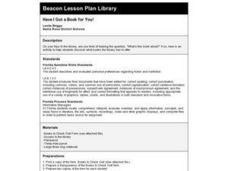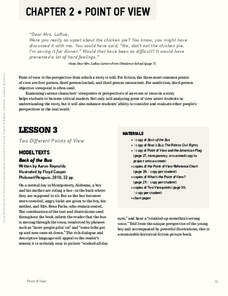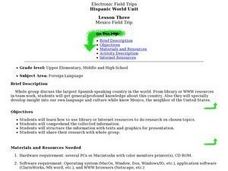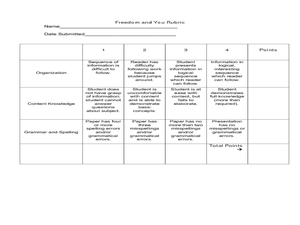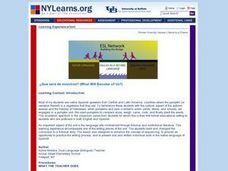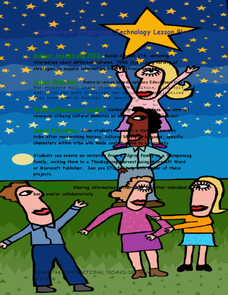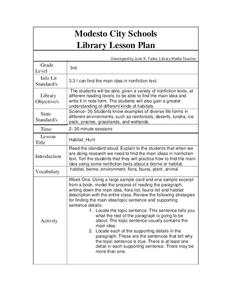Curated OER
Start Book
Students review their notes, drawings, photos and writing from the field trip to share with the whole group. They make a fiction or nonfiction storybook as a group. They include writing from all students and can include artwork and...
Curated OER
Sea Changes: A New England Industry
Students conduct research in order to use primary and secondary sources. They interpret and analyze information from textbooks and nonfiction books for young adults, as well as reference materials, audio and media presentations, oral...
Curated OER
Non-Fiction Read-aloud
Students listen to the reading of a book about the area of science they are currently studying.
Curated OER
Fiction and Nonfiction
Fourth graders differentiate between fiction and nonfiction using the books "Sarah Plain and Tall" and "A Day in the Prairie." They develop a list of information that they learn from the text, and create an information web. Students...
Curated OER
Have I Got a Book for You!
Fourth graders select a library book, read it and complete "Books to Check Out!" form. They compile their completed forms to a book to be displayed in the classroom for all readers to see.
Scholastic
Point of View
The point of view in a story can dramatically change the story itself. Focus on finding the points of view in various reading passages with a language arts packet, which includes fiction and nonfiction text.
Curated OER
A House is a House for Me: Library Skills for Young Readers
Read Mary Ann Hoberman's book A House is a House for Me to introduce the idea that a library is a house for shelves of books. Young readers practice alphabetizing in the picture book (easy fiction) section of the library. They learn how...
Curated OER
Mexico Field Trip
Explore how the library or Internet resources function as textual information. Young writers research a chosen topic then read and comprehend the collected information. They structure the information with texts and graphics for a...
Curated OER
How-To Books
Students apply their knowledge and create a how-to book of their own. In this early childhood language arts worksheet, students learn about non-fiction books and write their own procedural non-fiction booklets.
Curated OER
Reader's Workshop: Julius
First graders use prior knowledge and reading strategies for the story (Julius). In this reader's workshop lesson, 1st graders use elbow buddies to discuss parts of the story during guided reading. Students review reading...
Curated OER
Recognizing Text Features of Fiction, Poetry, and Drama
Students start reading the book The Sign of the Beaver and create a book mark glossary to define vocabulary for the book. In this reading lesson plan, students also respond to the text by completing a journal entry.
Curated OER
History: Fact of Fiction?
Students find a historial novel online and distinguish between fiction and nonfiction books. They research three historical events related to their novel and write a letter to a figure from their novel's time period.
Curated OER
Plants are Growing and Changing
Students explore living things. In this agriculture lesson, students read the book A Tree is a Plant and participate in an experiment to explore the patterns of change in living things. Students continue to observe the plant throughout...
Curated OER
Freedom and You
Students research the American Revolution. In this Revolutionary War lesson, students research facts about the American Revolution, write an expository essay, and peer edit for good content. The paper is suggested to be written after...
Curated OER
Reading Through Rainforests
Students investigate the concept of the rainforest through the use of nonfiction texts. The teacher reads to the class to give some information. Then they read their own books to find further information and perform the follow activities...
Curated OER
Immigration to the United States
Middle schoolers discover the implications of immigration. For this immigration lesson, students read fiction based on immigration experiences as well as non-fiction on the topic. Middle schoolers write and share book reviews of the...
Curated OER
?Que ser de nosotros? (What Will Become of Us?)
Students discuss uses of a pumpkin. They fill out graphic organizers. Students listen as the teacher reads a story, and participate by repeating sounds the objects make as the story progresses. One student narrates the story while others...
Curated OER
Prereading
Fourth graders participate in think-pair-share reading strategy in this lesson. They identify their purpose for reading as well as purposes for reading fiction/nonfiction. They list and discuss several prereading activities, and then...
Curated OER
Literal Meaning of Reading
Students demonstrate literal meaning of a fiction book. In this reading comprehension lesson, students listen to the book, If You Give a Mouse a Muffin and practice the "m" sound during the read aloud. Students answer questions about the...
Curated OER
Native Americans
First graders explore the lifestyles of several North American tribes. They investigate about the homes, food, transportation, and daily living habits of each tribe. Pupils use a map to locate several Native American tribes in North...
Curated OER
You Be the Judge
Students explore nonfiction writing by completing a worksheet in class. In this research questions lesson, students read several stories about the Wild West icons Wyatt Earp and Wild Bill Hickok. Students answer study questions about the...
Curated OER
Habitat Hunt
Third graders read several nonfiction texts and practice finding the main idea for the text as well as learn about various habitats. In this main idea lesson plan, 3rd graders read several nonfiction texts and make habitat cards....
Curated OER
Organizing Main Ideas and Supporting Details
Students read given information and identify the main ideas and specific detail of the story. In groups, they read a historical title and create a "book talk" for each one, summarizing the story. In addition, students create a...
Curated OER
We Like to Imagine - Animals
Students describe a pretend animal. They read "The After School Monster." Students read other books and discuss whether or not the characters are real. Students make a drawing of a pretend animal and of a real animal. They make up a...




